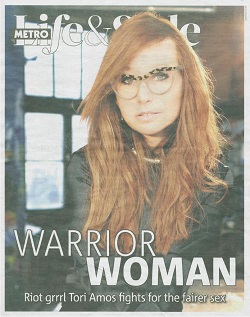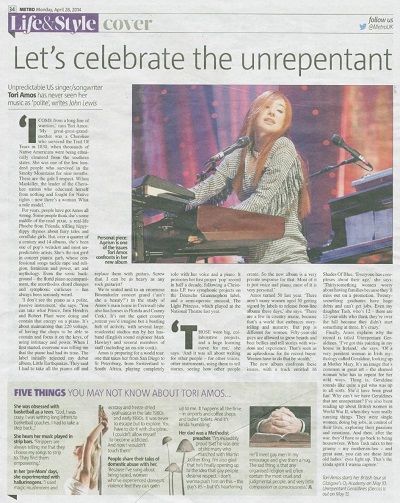|

songs | interviews | photos | tours | boots | press releases | timeline
Metro Life & Style (UK)
April 29, 2014

Let's celebrate the unrepentant
Unpredictable US singer/songwriter Tori Amos has never seen her music as "polite", writes John Lewis
'I come from a long line of warriors,' says Tori Amos. 'My great-great-grandmother was a Cherokee who survived the Trail Of Tears in 1830, when thousands of Native Americans were being ethnically cleansed from the southern states. She was one of the few hundred people who survived in the Smoky Mountains for nine months. These are the gals I respect. Wilma Mankiller, the leader of the Cherokee nation who educated herself from nothing and fought for Native rights -- now there's a woman. What a role model.'
For years, people have got Amos all wrong. Some people think she's some middle-of-the-road pixie, a real-life Phoebe from Friends, trilling hippy-dippy rhymes about fairy tales and cornflake girls. But, over a quarter of a century and 14 albums, she's been one of pop's weirdest and most unpredictable artists. She's the riot grrrl in concert pianist garb, whose confessional songs tackle rape and religion, feminism and power, art and mythology. Even the sonic background -- the florid piano accompaniment, the unorthodox chord changes and symphonic curlicues -- has always been seriously weird.
'I don't see the piano as a polite, passive instrument,' she says. 'You can take what Prince, Jimi Hendrix and Robert Plant were doing and contain that energy on a piano. It's about maintaining that 220 voltage, of having the chops to be able to contain and focus it on the keys, of using intimacy and power. When I first started, everyone was telling me that the piano had had its time. The label initially rejected my debut album, Little Earthquakes. They said I had to take all the pianos off and replace them with guitars. Screw that. I can be as heavy as any rock guitarist!'
We're seated next to an enormous Bosendorfer concert grand ('ain't she a beauty?') in the study of Amos's main home in Cornwall (she also has houses in Florida and County Cork). It's not the quiet country retreat you'd imagine but a bustling hub of activity, with several large, residential studios run by her husband (English sound engineer Mark Hawley) and several members of staff (including an on-site cook).
Amos is preparing for a world tour, one that takes her from San Diego to St Petersburg, from Switzerland to South Africa, playing completely solo with her voice and a piano. It promotes her first proper 'pop' record in half a decade, following a Christmas LP, two symphonic projects on the Deutsche Grammophon label, and a semi-operatic musical, The Light Princess, which played at the National Theatre last year.
'Those were big, collaborative projects, and a huge learning curve for me,' she says. 'And it was all about writing for other people -- for other voices, other instruments, using them to tell stories, seeing how other people create. So the new album is a very private response for that. Most of it is just voice and piano, most of it is very personal.'
Amos turned 50 last year. 'There aren't many women aged 50 getting signed by labels to release front-line albums these days,' she says. 'There are a few in country music, because that's a world that embraces story-telling and maturity. But pop is different for women. Fifty-year-old guys are allowed to grow beards and beer bellies and tell stories with wisdom and experience. That's seen as an aphrodisiac for the record buyer. Women have to do that by stealth.'
The new album confronts these issues, with a track entitled 16 Shades Of Blue. 'Everyone has complexes about their age,' she says. 'Thirtysomething women worry about having families because they'll miss out on a promotion. Twentysomething graduates have huge debts and can't get jobs. Even my daughter Tash, who's 12 -- there are 12-year-olds who think they're over the hill because they didn't start something at three. It's crazy.'
Finally, Amos explains why the record is titled Unrepentant Geraldines. 'I've got this painting in my house in Ireland,' she says. 'Of a very penitent woman in Irish mythology called Geraldine, looking up at Mother Mary. It's an image that's common in great art -- the shamed woman who has to repent for her wild ways. Thing is, Geraldine sounds like quite a gal who was up to all sorts. She'd have been great fun! Why can't we have Geraldines that are unrepentant? I've also been reading up about British women in World War II, when they were really running things. They were single women, doing big jobs, in control of their lives, exploring their passions and emotions. And then, after the war, they'd have to go back to being housewives. When Tash talks to her granny -- my mother-in-law -- and great aunt, you can see these little old ladies' eyes light up. That's the kinda spirit I wanna capture.'
Tori Amos starts her British tour at Glasgow's O2 Academy on May 10. Unrepentant Geraldines (Decca) is out on May 13.
~ ~ ~
FIVE THINGS YOU MAY NOT KNOW ABOUT TORI AMOS...
She was obsessed with basketball as a teen. "God, I was crazy. I was writing long letters to basketball coaches. I had to take a step back..."
She hears her music played in strip bars. "Strippers are always telling me that they choose my songs to strip to. They find them empowering."
In her "pre-Mom" days, she experimented with hallucinogens. "I used magic mushrooms and ecstasy and freeze-dried ayahuasca in the late 1980s and early 1990s. It was never to escape but to explore. You have to do it with discipline. I couldn't allow myself to become addicted. And now I wouldn't touch them."
People share their tales of domestic abuse with her. "Because I've sung about being raped, women who've experienced domestic violence feel they can open up to me. It happens all the time -- in airports and coffee shops and ladies' toilets. And it's kinda humbling."
Her dad was a Methodist preacher. "I'm incredibly proud that he was one of the many who marched with Martin Luther King. I'm also glad that he's finally opening up to the idea that gay people deserve respect. I don't wanna push him on this -- the guy's 85 -- but it's heartening. He'll meet gay men in my entourage and give them a hug. The sad thing is that any organised religion will often contain the most cruel and judgmental people, and very little compassion or consciousness."

t o r i p h o r i a
tori amos digital archive
yessaid.com
|